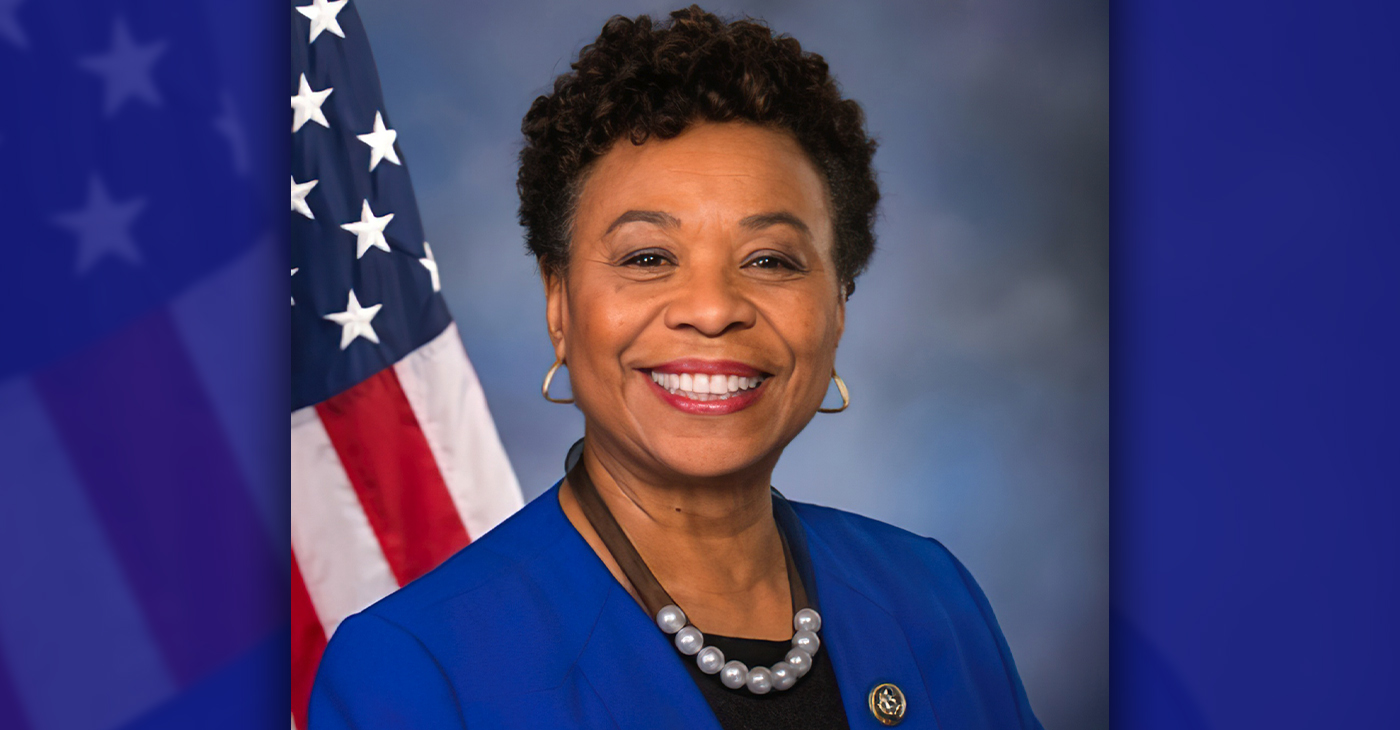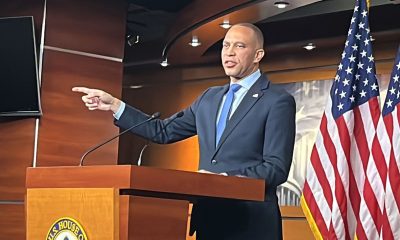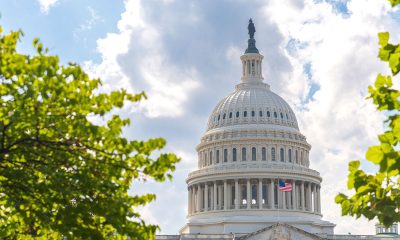City Government
Barbara Lee, 2 Other Lawmakers Maneuver to Force Vote on Legislation to Restore Roe
U.S. Reps. Barbara Lee (D-CA), Diana DeGette (D-CO), and Judy Chu (D-CA) filed a “discharge petition” on Wednesday that could force Speaker Kevin McCarthy to hold a vote on the Women’s Health Protection Act – a landmark piece of legislation that would restore the protections that were in place under Roe v. Wade.

A discharge petition filed Wednesday could force the GOP-led House to hold a vote on a landmark abortion-rights bill
U.S. Reps. Barbara Lee (D-CA), Diana DeGette (D-CO), and Judy Chu (D-CA) filed a “discharge petition” on Wednesday that could force Speaker Kevin McCarthy to hold a vote on the Women’s Health Protection Act – a landmark piece of legislation that would restore the protections that were in place under Roe v. Wade.
As the nation approaches the one-year anniversary of the U.S. Supreme Court’s decision to overturn Roe v. Wade, and with the support of Democratic leadership in the House, this trio of House lawmakers are seeking to employ a seldom-used legislative tactic that could force the GOP-led House to hold a vote on a key piece of legislation that would restore every American’s right to abortion care.
“In every election or poll since the Dobbs decision, the American people have made their support for reproductive rights clear,” said Lee, the co-chair of the Congressional Pro-Choice Caucus.
“My colleagues in Congress now have a choice: either trust your constituents to make the best decisions for themselves about their bodies, health, and lives, or go against the will of the people and continue to restrict a fundamental personal freedom.
“The decision to have an abortion should be between a person and their doctor—NOT politicians. The Pro-Choice Caucus is sending a message to the American people that we will not stop fighting to defend your right to make your own decisions over your bodies.”
“If my colleagues on the other side of the aisle aren’t willing to stand up for the people they represent, then we must,” DeGette, who serves as co-chair of the Congressional Pro-Choice Caucus, said on the House floor Wednesday to announce the trio’s decision to file the petition.
“We may not have the majority in this chamber, but there is no doubt that we have the majority of Americans on our side in this fight. Now is the time to end the devastation that too many Americans have already experienced. Now is the time to let the American public know exactly where every member of this chamber stands.”
“With House Republicans beholden to their extreme MAGA members, they refuse to restore and strengthen Americans’ reproductive rights,” said Chu, the prime sponsor of the Women’s Health Protection Act. “I am beyond proud to work with House Democratic leadership and the Pro-Choice Caucus to offer the Women’s Health Protection Act in a discharge petition to force accountability for their inaction.
“House Members who do not add their signature are telling Americans that they shouldn’t have the freedom to make their own healthcare decisions,” Chu concluded.
Under House rules, if a discharge petition to force a vote on a particular piece of legislation is signed by 218 members of the House, it must immediately be brought before the full House for a vote, regardless of any objections or attempts by GOP leadership to block the legislation from being considered.
In this case, if the petition Lee, DeGette, and Chu filed Wednesday is signed by 218 members of the House, Speaker McCarthy and his allies would be required to immediately hold a vote on the Women’s Health Protection Act, which the House approved twice last year.
The move comes as more than one dozen states across the country have enacted laws banning or extremely limiting women’s right to access abortion services in the wake of the Supreme Court’s decision last June.
If approved, the Women’s Health Protection Act would restore the protections that were in place under Roe and nullify any state or local government’s restrictions that have been put in place to limit, or outright prohibit, patients’ access to abortion care.
Now that it’s been filed, the discharge petition introduced by Lee, DeGette, and Chu will remain open for members to sign.
At any time, if the discharge petition filed Wednesday garners 218 signatures, the Women’s Health Protection Act will be called up for a vote – despite the GOP’s intent on preventing it from being considered.
From U.S. Rep. Barbara Lee’s media relations office.
Activism
Oakland Post: Week of November 26 – December 2, 2025
The printed Weekly Edition of the Oakland Post: Week of November 26 – December 2, 2025

To enlarge your view of this issue, use the slider, magnifying glass icon or full page icon in the lower right corner of the browser window.
Activism
Oakland Post: Week of November 19 – 25, 2025
The printed Weekly Edition of the Oakland Post: Week of November 19 – 25, 2025

To enlarge your view of this issue, use the slider, magnifying glass icon or full page icon in the lower right corner of the browser window.
Activism
IN MEMORIAM: William ‘Bill’ Patterson, 94
Bill devoted his life to public service and education. In 1971, he became the founding director for the Peralta Community College Foundation, he also became an administrator for Oakland Parks and Recreation overseeing 23 recreation centers, the Oakland Zoo, Children’s Fairyland, Lake Merritt, and the Henry J. Kaiser Convention Center.

William “Bill” Patterson, 94, of Little Rock, Arkansas, passed away peacefully on October 21, 2025, at his home in Oakland, CA. He was born on May 19, 1931, to Marie Childress Patterson and William Benjamin Patterson in Little Rock, Arkansas. He graduated from Dunbar High School and traveled to Oakland, California, in 1948. William Patterson graduated from San Francisco State University, earning both graduate and undergraduate degrees. He married Euradell “Dell” Patterson in 1961. Bill lovingly took care of his wife, Dell, until she died in 2020.
Bill devoted his life to public service and education. In 1971, he became the founding director for the Peralta Community College Foundation, he also became an administrator for Oakland Parks and Recreation overseeing 23 recreation centers, the Oakland Zoo, Children’s Fairyland, Lake Merritt, and the Henry J. Kaiser Convention Center.
He served on the boards of Oakland’s Urban Strategies Council, the Oakland Public Ethics Commission, and the Oakland Workforce Development Board.
He was a three-term president of the Oakland branch of the NAACP.
Bill was initiated in the Gamma Alpha chapter of Kappa Alpha Psi Fraternity.
In 1997 Bill was appointed to the East Bay Utility District Board of Directors. William Patterson was the first African American Board President and served the board for 27 years.
Bill’s impact reached far beyond his various important and impactful positions.
Bill mentored politicians, athletes and young people. Among those he mentored and advised are legends Joe Morgan, Bill Russell, Frank Robinson, Curt Flood, and Lionel Wilson to name a few.
He is survived by his son, William David Patterson, and one sister, Sarah Ann Strickland, and a host of other family members and friends.
A celebration of life service will take place at Henry J. Kaiser Convention Center (Calvin Simmons Theater) on November 21, 2025, at 10 AM.
His services are being livestreamed at: https://www.facebook.com/events/1250167107131991/
In lieu of flowers, donations can be made to the Euradell and William Patterson scholarship fund TBA.

-

 Activism3 weeks ago
Activism3 weeks agoOakland Post: Week of November 12 – 18, 2025
-

 Activism4 weeks ago
Activism4 weeks agoOakland Post: Week of November 5 – 11, 2025
-

 Activism2 weeks ago
Activism2 weeks agoIN MEMORIAM: William ‘Bill’ Patterson, 94
-

 Activism3 weeks ago
Activism3 weeks agoHow Charles R. Drew University Navigated More Than $20 Million in Fed Cuts – Still Prioritizing Students and Community Health
-

 #NNPA BlackPress3 weeks ago
#NNPA BlackPress3 weeks agoThe Perfumed Hand of Hypocrisy: Trump Hosted Former Terror Suspect While America Condemns a Muslim Mayor
-

 #NNPA BlackPress3 weeks ago
#NNPA BlackPress3 weeks agoProtecting Pedophiles: The GOP’s Warped Crusade Against Its Own Lies
-

 Bay Area3 weeks ago
Bay Area3 weeks agoNo Justice in the Justice System
-

 #NNPA BlackPress4 weeks ago
#NNPA BlackPress4 weeks ago2026 Subaru Forester Wilderness Review: Everyday SUV With Extra Confidence
























































